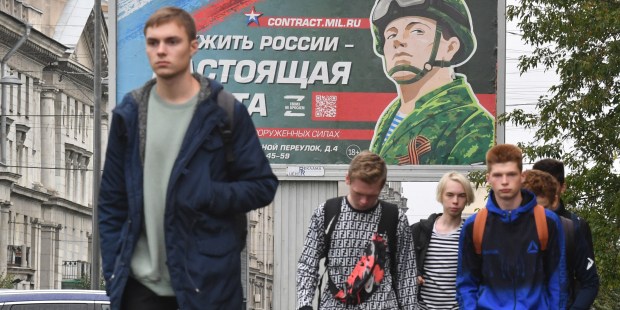Meanwhile, Pope Francis resists oversimplification of the conflict.
Russia’s Catholic Bishops’ Conference issued a statement calling Moscow’s invasion of Ukraine a “hard confrontation” that “threatens the existence of the whole world”.
Following Russian President Vladimir Putin’s partial mobilization to bolster his war efforts in Ukraine, the Russian Catholic Bishops’ Conference issued an appeal in which it said the “special military operation” had caused “thousands of casualties and “undermined trust and unity between countries”. .”
“The harsh confrontation in Ukraine has degenerated into a full-scale military conflict which has already caused thousands of casualties, undermined trust and unity between countries and peoples and threatens the existence of the whole world”, indicates the communiqué, published on Wednesday and signed by Bishop Paolo Pezzi of the Latin Catholic Archdiocese of the Mother of God in Moscow, on behalf of the Episcopal Conference.
The country’s Latin Catholic bishops, who number just five, have called for peace.
Since the invasion of Ukraine on February 24, the Russian government has suppressed anti-war protests in Russia. Even calling the “special military operation” a war could put someone in jail.
Putin’s recent call for military reservists has sparked popular protests and a mass exodus of men from the country who are unwilling to fight in Ukraine.
“We wish to follow the teaching of the Church, according to the Gospel and the Tradition of the ancient Church: war has never been nor will it be a means of solving problems between nations,” said the appeal of the bishops, quoting Pope Pius XII. , who declared in 1939: “Nothing is lost in peace, everything can be lost in war”.
They also quote Pope Francis, who said during a Mass he celebrated in Kazakhstan on September 14:
“May we never grow accustomed to war, nor resign ourselves to its inevitability. Let us come to the aid of those who suffer and insist that genuine efforts be made to achieve peace. What more needs to happen, and how many more deaths will it take, before conflict gives way to dialogue for the good of peoples, nations and all of humanity? The only solution is peace and the only way to achieve peace is through dialogue.
Conscientious objection
The Russian bishops’ conference recognizes that governments must sometimes defend themselves militarily, and that citizens called upon to fight must fulfill their duty as long as their conscience discerns that military action is justifiable. They cite the Catechism of the Catholic Church (2302-2317), which admits recourse to war for self-defense and only in the event that certain conditions arise.
Contrary to a government announcement on September 25 that conscientious objectors will not be able to perform community service instead of taking up arms, the bishops say in their statement that the Russian Constitution protects objectors of consciousness.
Their appeal also clarifies that the participation of bishops in war is prohibited by Church tradition and by international conventions.
The document ends with a call to all Catholics in Russia to pray and fast for peace and to priests to offer Mass with specific prayers for the same intention.
Pope: War is complicated
Meanwhile, a transcript of a conversation between Pope Francis and Jesuits in Russia and other countries has been released, further revealing the pope’s attitude to the Russian invasion of Ukraine.
“There’s a war going on and I think it’s a mistake to think of it as a cowboy movie where there are good guys and bad guys,” Francis said. September 15, at a meeting he held during his apostolic journey to Kazakhstan. “It is also a mistake to think that this is a war between Russia and Ukraine and nothing more. No, it is a world war.
The Jesuit pope regularly met other members of the Society of Jesus during his trips abroad. This meeting was with Jesuits working in the Russian Region of the Society of Jesus, more precisely in Russia, Belarus and Kyrgyzstan.
His comments echoed previous statements that challenged the narrative that responsibility for the invasion of Ukraine should be placed entirely on Moscow. He said it wasn’t that simple.
“You have to investigate the dynamics that developed the conflict,” he said. “There are international factors that helped to provoke the war. I have already mentioned that a Head of State, last December, came to tell me that he was very worried because NATO had gone barking at Russia’s gates without understanding that the Russians are imperial and fear the border insecurity. He expressed fear that it would cause a war, and it broke out two months later.
As Russia mounted a military buildup along Ukraine’s borders throughout 2021 and early 2022, Putin expressed concern that the North Atlantic Treaty Organization had extended to countries closer and closer to Russia. He specifically asked for assurances that Ukraine would not join the Alliance.
“So we cannot be simplistic in reasoning about the causes of the conflict. I see conflicting imperialisms,” the pontiff continued. “And, when they feel threatened and in decline, the imperialisms react, thinking that the solution is to start a war to catch up with it, and also to sell and test weapons.”
Again, Francis expressed his view that “we are already living through World War III,” an idea he has been proposing in recent years.
Despite the Pope’s allusion to the conversation with the unnamed “head of state”, he insisted that the “victim” of the current conflict is Ukraine. He reminded his listeners that in the past he had called the invasion of Ukraine “unacceptable, repugnant, senseless, barbaric and sacrilegious aggression”.
He appeals for Ukraine to almost every public address.


